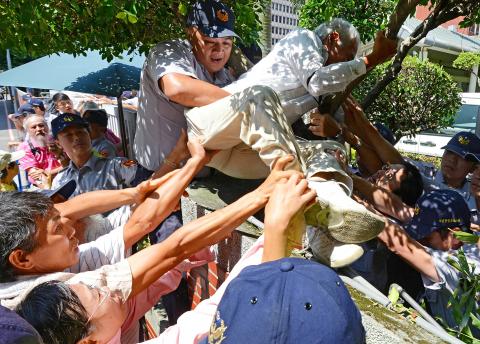A public opinion poll released yesterday showed that most people support fair trade and cross-strait trade liberalization, but lack confidence in the capability of President Ma Ying-jeou’s (馬英九) administration to safeguard Taiwanese interests in its engagement with China.
The survey, conducted by Taiwan Indicators Survey Research (TISR), asked respondents about their views on a recently signed service trade pact between Taiwan and China. It found that 58.7 of respondents supported Taiwan’s pursuit of economic partnership agreements in general; only 16.5 percent did not support the move and 24.8 percent declined to answer.
However, opinions were divided on cross-strait economic relations, with 43.3 percent of respondents saying they believed Ma’s push for cross-strait trade liberalization would improve Taiwan’s competitiveness, while 34.3 percent said the president’s policy would increase the nation’s economic dependence on China.

Photo: Sam Yeh, AFP
The survey also found that 42.7 percent of respondents thought the service trade agreement was unnecessary — almost 10 percentage points higher than the 32.6 percent who supported the pact — while 24.7 percent said they had no opinion.
A further breakdown of the poll data showed how opinions were divided along political lines, with 57.9 percent of pan-blue supporters favoring the pact and 72.5 percent of pan-green supporters opposing the deal.
Opinions among those who identified themselves as independent voters were more balanced: 40.4 percent disapproved of the pact, against 27.2 percent who supported it.
Public confidence in the Ma administration’s ability was also low, with 62.3 percent of respondents saying they did not believe the government would be able to reduce the adverse impact of opening the domestic market to China and to safeguard local industries’ interests. Only 21.6 percent of respondents expressed their confidence in the government, while 16.1 percent gave no answer.
According to TISR, the percentage of respondents who said they were confident about the Ma administration’s capability to deal with the impact of cross-strait trade liberalization dropped by 9.1 percentage points compared with a poll conducted in 2009, when Taipei began negotiations with Beijing over the Economic Cooperation Framework Agreement (ECFA).
At the same time, the number of people who were doubtful of the government’s capability to deal with the issue increased by 13.1 percentage points, TISR said in a press release.
The survey also found that Premier Jiang Yi-huah’s (江宜樺) approval rating of 17.7 percent was the lowest since he assumed the post in February, while Ma’s disapproval rating remained dismal at 70.7 percent.
The survey, conducted from July 24 to 26, collected 1,008 valid samples and had a margin of error of 3.1 percentage points.

The CIA has a message for Chinese government officials worried about their place in Chinese President Xi Jinping’s (習近平) government: Come work with us. The agency released two Mandarin-language videos on social media on Thursday inviting disgruntled officials to contact the CIA. The recruitment videos posted on YouTube and X racked up more than 5 million views combined in their first day. The outreach comes as CIA Director John Ratcliffe has vowed to boost the agency’s use of intelligence from human sources and its focus on China, which has recently targeted US officials with its own espionage operations. The videos are “aimed at

STEADFAST FRIEND: The bills encourage increased Taiwan-US engagement and address China’s distortion of UN Resolution 2758 to isolate Taiwan internationally The Presidential Office yesterday thanked the US House of Representatives for unanimously passing two Taiwan-related bills highlighting its solid support for Taiwan’s democracy and global participation, and for deepening bilateral relations. One of the bills, the Taiwan Assurance Implementation Act, requires the US Department of State to periodically review its guidelines for engagement with Taiwan, and report to the US Congress on the guidelines and plans to lift self-imposed limitations on US-Taiwan engagement. The other bill is the Taiwan International Solidarity Act, which clarifies that UN Resolution 2758 does not address the issue of the representation of Taiwan or its people in

US Indo-Pacific Commander Admiral Samuel Paparo on Friday expressed concern over the rate at which China is diversifying its military exercises, the Financial Times (FT) reported on Saturday. “The rates of change on the depth and breadth of their exercises is the one non-linear effect that I’ve seen in the last year that wakes me up at night or keeps me up at night,” Paparo was quoted by FT as saying while attending the annual Sedona Forum at the McCain Institute in Arizona. Paparo also expressed concern over the speed with which China was expanding its military. While the US

SHIFT: Taiwan’s better-than-expected first-quarter GDP and signs of weakness in the US have driven global capital back to emerging markets, the central bank head said The central bank yesterday blamed market speculation for the steep rise in the local currency, and urged exporters and financial institutions to stay calm and stop panic sell-offs to avoid hurting their own profitability. The nation’s top monetary policymaker said that it would step in, if necessary, to maintain order and stability in the foreign exchange market. The remarks came as the NT dollar yesterday closed up NT$0.919 to NT$30.145 against the US dollar in Taipei trading, after rising as high as NT$29.59 in intraday trading. The local currency has surged 5.85 percent against the greenback over the past two sessions, central